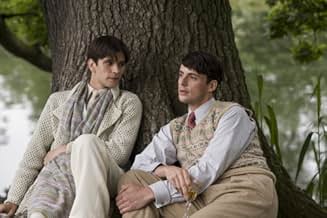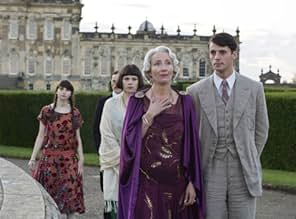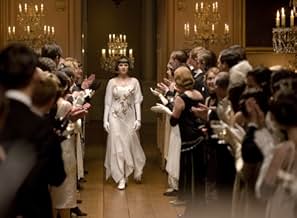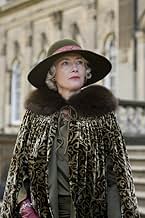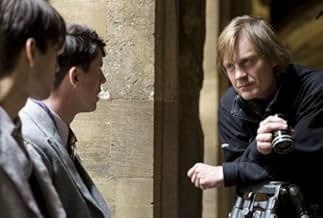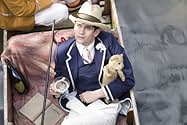PUNTUACIÓN EN IMDb
6,6/10
14 mil
TU PUNTUACIÓN
Un amor prohibido florece durante la Segunda Guerra Mundial.Un amor prohibido florece durante la Segunda Guerra Mundial.Un amor prohibido florece durante la Segunda Guerra Mundial.
- Premios
- 11 nominaciones en total
Argumento
¿Sabías que...?
- CuriosidadesDame Emma Thompson threatened to quit this movie if the producers persisted in pushing actress Hayley Atwell to lose weight. Atwell said that Harvey Weinstein even insulted her over lunch by saying: "You look like a fat pig on-screen. Stop eating so much."
- PifiasAfter the dinner, at which Charles first meets Lady Marchmain, the family go to pray in the private chapel. The ladies, as Roman Catholics, would have covered their heads with a scarf or a veil.
- Citas
Sebastian Flyte: I asked too much of you. I knew it all along, really. Only God can give you that sort of love.
Reseña destacada
Every once in a few decades something like Brideshead comes along. No wonder anyone would want to try to relive that magic! So now there is Brideshead the movie. That means the director had to grasp the original TV show in two hours, so no other choice than a 'The Best Of' compilation remains, it seems.The disadvantage of it is, that what is left out suddenly becomes painfully missing.
All of us who have watched the TV series know it is virtually impossible to surpass it, in film or TV production. Nevertheless, I tried to watch it without prejudice. Overall not a bad movie, but no, not the magical resonance the original had.
All I can do is summarize in details the pluses and minuses of the film versus the TV production so here it goes:
The fathers from original were two of the best actors of the century; John Geilgud (Shakespeare) and the (incomparable) Laurence Olivier. Geilgud plays brilliantly the teasing but not totally indifferent father, who seems stop Charles from the insipid surroundings in the summer but finally lets him go. In the TV series the actor is more serious, and the fun is not there. Laurence had probably one of the best performances of all, and clearly echoes his naughtiness as he portrayed in A Little Romance then a few years earlier. His unpredictability which finally makes him decide for his daughter is well done, especially considered his playground was virtually no more than a static death bed! And then the scene where he is offered a ride in a car down the steps, which he refuses since he doesn't want to admit it might be his last.
Matthew Goode does quite a good job as a substitute of Jeremy Irons. I like especially his ambivalent apparition (homosexual, heterosexual, both, or doesn't it matter?). But he lacks the wonderful narrating voice of Irons, which research has shown to be one of the best around. In the film the romance between Charles and Sebastian's sister is elaborated much more. Partially I agree with this choice. In the original not enough scenes were implanted for credibility, except probably the scene where Charles lights her cigarette. They were virtually strangers meeting again on the cruiser years later and nevertheless they seemed to suddenly hit it off. The sister was not what stood Charles' and Sebastian's friendship in the way. The filmmakers choose for more stress on their impending romance. I think the TV original did this better; it was the family that Charles became part of, and Sebastian's indifference to love that became unsurpassable problems. In original the mother was almost invisible, with the exception of some quotes on her son like 'I don't understand it', which summed it all up. We do not need the dialog in the film where she explains herself, and wonders why her kids hate her. Understatement is much more powerful, also in the scene 'I'll say no more' between Charles and Julia, in which it becomes clear religion has driven them apart. One sentence can be enough.
All this was at the cost of stress Sebastian could have had, and got in the TV original. Most of the magic of Brideshead was simply Anthony Andrews' performance. Worse, the movie clearly alludes to a homosexual relationship, which it did not need to be. Sebastian was a love object, and could be loved by anyone, in any way. But then again, it might be hard finding someone that could deliver the line about Sebastian as Irons narrated: 'his beauty, arresting'. Charm was the problem, the danger. That missed in this film. It was charm that nearly got Charles astray, as told by the queer friend years later in his atelier. The film omitted this important scene, where that friend tried to warn Charles for Sebastian. At the time we all thought it was a nasty remark, but later on he seemed to be right. Or was the charm not an illusion after all? The film simply did not have enough time to build up the charm Sebastian surely had in the TV original. In the TV series Charles was shown first with boring friends, and it then became shortly a coming of age story, where he got introduced in a more fun crowd with Sebastian. This phase delivered some of the best scenes of the story, with his queer friend talking loud over the campus, or Sebastian dressing up as a man with mustache. Sebastian showed Charles other worlds, which real or not, were unforgettable. The film had to rush this too much, and therefore the introduction scene with the spring eggs lost its magic.
One of the few pluses was much less stress on Cordelia, the little girl. But the minus was she acted as an indirect narrator of the importance of religion. Now it had to be compensated for in dialog with the mother and Julia, which was in TV better since there meaning came out of things not said.
Many things I missed, but you can not cram all in two hours. But lines like 'I would like to remember Sebastian, how he were that summer, when we walked through the enchanted place' should have been told again.
The end was nicely done, with Charles finally not pinching candlelight, symbolic for the charm of that family that was still alive in him. I liked there the Irons narrative though 'Was it all vanity? Etc.'
I would say, it was a brave attempt, something like making a remake of 2001, or Casablanca or Breakfast at Tiffany's, and the acting was all well done. Also camera work, and story adaptation. But who can surpass Anthony Andrews, or Jeremy Irons, or Gielgud or Olivier?
All of us who have watched the TV series know it is virtually impossible to surpass it, in film or TV production. Nevertheless, I tried to watch it without prejudice. Overall not a bad movie, but no, not the magical resonance the original had.
All I can do is summarize in details the pluses and minuses of the film versus the TV production so here it goes:
The fathers from original were two of the best actors of the century; John Geilgud (Shakespeare) and the (incomparable) Laurence Olivier. Geilgud plays brilliantly the teasing but not totally indifferent father, who seems stop Charles from the insipid surroundings in the summer but finally lets him go. In the TV series the actor is more serious, and the fun is not there. Laurence had probably one of the best performances of all, and clearly echoes his naughtiness as he portrayed in A Little Romance then a few years earlier. His unpredictability which finally makes him decide for his daughter is well done, especially considered his playground was virtually no more than a static death bed! And then the scene where he is offered a ride in a car down the steps, which he refuses since he doesn't want to admit it might be his last.
Matthew Goode does quite a good job as a substitute of Jeremy Irons. I like especially his ambivalent apparition (homosexual, heterosexual, both, or doesn't it matter?). But he lacks the wonderful narrating voice of Irons, which research has shown to be one of the best around. In the film the romance between Charles and Sebastian's sister is elaborated much more. Partially I agree with this choice. In the original not enough scenes were implanted for credibility, except probably the scene where Charles lights her cigarette. They were virtually strangers meeting again on the cruiser years later and nevertheless they seemed to suddenly hit it off. The sister was not what stood Charles' and Sebastian's friendship in the way. The filmmakers choose for more stress on their impending romance. I think the TV original did this better; it was the family that Charles became part of, and Sebastian's indifference to love that became unsurpassable problems. In original the mother was almost invisible, with the exception of some quotes on her son like 'I don't understand it', which summed it all up. We do not need the dialog in the film where she explains herself, and wonders why her kids hate her. Understatement is much more powerful, also in the scene 'I'll say no more' between Charles and Julia, in which it becomes clear religion has driven them apart. One sentence can be enough.
All this was at the cost of stress Sebastian could have had, and got in the TV original. Most of the magic of Brideshead was simply Anthony Andrews' performance. Worse, the movie clearly alludes to a homosexual relationship, which it did not need to be. Sebastian was a love object, and could be loved by anyone, in any way. But then again, it might be hard finding someone that could deliver the line about Sebastian as Irons narrated: 'his beauty, arresting'. Charm was the problem, the danger. That missed in this film. It was charm that nearly got Charles astray, as told by the queer friend years later in his atelier. The film omitted this important scene, where that friend tried to warn Charles for Sebastian. At the time we all thought it was a nasty remark, but later on he seemed to be right. Or was the charm not an illusion after all? The film simply did not have enough time to build up the charm Sebastian surely had in the TV original. In the TV series Charles was shown first with boring friends, and it then became shortly a coming of age story, where he got introduced in a more fun crowd with Sebastian. This phase delivered some of the best scenes of the story, with his queer friend talking loud over the campus, or Sebastian dressing up as a man with mustache. Sebastian showed Charles other worlds, which real or not, were unforgettable. The film had to rush this too much, and therefore the introduction scene with the spring eggs lost its magic.
One of the few pluses was much less stress on Cordelia, the little girl. But the minus was she acted as an indirect narrator of the importance of religion. Now it had to be compensated for in dialog with the mother and Julia, which was in TV better since there meaning came out of things not said.
Many things I missed, but you can not cram all in two hours. But lines like 'I would like to remember Sebastian, how he were that summer, when we walked through the enchanted place' should have been told again.
The end was nicely done, with Charles finally not pinching candlelight, symbolic for the charm of that family that was still alive in him. I liked there the Irons narrative though 'Was it all vanity? Etc.'
I would say, it was a brave attempt, something like making a remake of 2001, or Casablanca or Breakfast at Tiffany's, and the acting was all well done. Also camera work, and story adaptation. But who can surpass Anthony Andrews, or Jeremy Irons, or Gielgud or Olivier?
- martijn-56
- 15 ene 2009
- Enlace permanente
Selecciones populares
Inicia sesión para calificar y añadir a tu lista para recibir recomendaciones personalizadas
- How long is Brideshead Revisited?Con tecnología de Alexa
Detalles
- Fecha de lanzamiento
- Países de origen
- Sitio oficial
- Idiomas
- Títulos en diferentes países
- Retorn a Brideshead
- Localizaciones del rodaje
- Empresas productoras
- Ver más compañías en los créditos en IMDbPro
Taquilla
- Presupuesto
- 20.000.000 US$ (estimación)
- Recaudación en Estados Unidos y Canadá
- 6.432.256 US$
- Fin de semana de estreno en EE. UU. y Canadá
- 339.616 US$
- 27 jul 2008
- Recaudación en todo el mundo
- 13.451.186 US$
- Duración2 horas 14 minutos
- Color
- Mezcla de sonido
- Relación de aspecto
- 2.35 : 1
Contribuir a esta página
Sugerir un cambio o añadir el contenido que falta

Principal laguna de datos
By what name was Retorno a Brideshead (2008) officially released in India in English?
Responde

